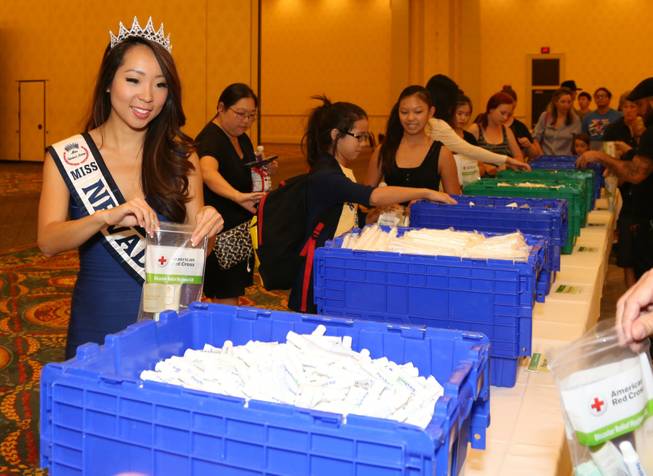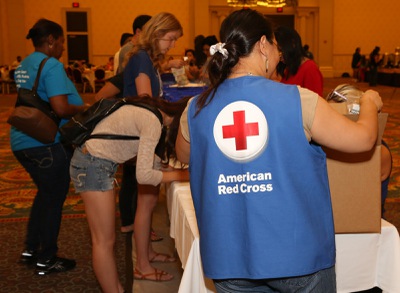
Courtesy
Lisa Song Sutton, Miss Nevada United States 2014, and hundreds of other volunteers build disaster-relief kits through a joint effort by Las Vegas Sands and Clean the World on Saturday, Sept. 20, 2014. The kits will be given to the Red Cross.
Sunday, Sept. 21, 2014 | 2 a.m.
Madison Teague knows exactly what to write on the small green cards.
"A lot of 'God blesses' and prayers," she said.
The cards slowly pile up on her table until another volunteer comes and whisks them away, dropping them one by one into baggies holding soap and other hygiene products. The kits will eventually go to the Red Cross, which will give them to disaster victims. For some, it will be the first comfort they receive after watching their house burn down or wash away in a flood.
"I also write a lot of 'I love yous' because that's what they need most," she said, piling a few more on the table.
Teague, along with 399 other volunteers, formed into assembly lines that churned out thousands of the baggies Saturday during a two-hour shift in a ballroom at the Venetian. They were the first volunteers in a joint effort by Las Vegas Sands and international nonprofit Clean the World to make 100,000 disaster relief kits by Sunday. The previous record for a similar event was 18,000 kits.
To achieve the number, about 3,000 volunteers would have to bag 14,000 kits during every two-hour shift until the end of the event Sunday evening.
"To imagine where these kits are going is extremely meaningful," said Erin Robbins, a Sands employee who took time Saturday to volunteer with her husband. "It really hits it home for you how many people are affected by disasters."
Clean the World, founded in 2009 by Shawn Seipler and Paul Till, recycles leftover soap and hygiene products from hotels around the world. The organization then distributes them to disaster victims in the United States and to impoverished countries abroad.
Seipler, who previously worked as vice president of sales for a tech company, got the idea for the nonprofit one night while staying at a Holiday Inn in Minneapolis during a business trip in late 2008. He called the front desk and asked what the hotel did with all the leftover soap. The staff told him it was thrown away like all the other garbage.
Seipler and Till then began research on how to recycle soap, which led them to this statistic: Respiratory infections and diarrheal diseases kill about 3.5 million children younger than 5 each year. In Africa, they kill more children than malaria and HIV combined. Most importantly, they are preventable with proper hygiene.
"It all dawned on me that all this soap we're wasting could go to save children's lives," he said. "I looked at my wife one day and I said, 'Sweetie, we're going to recycle soap.'"
The operation began out of the garage of Seipler's Orlando, Fla., home a year later. Volunteers used meat grinders and potato peelers to break down the leftover soap.
Five years later, Clean the World has three industrial recycling centers and a full-time staff of about 50. The facility in Orlando handles the bulk of the organization's recycling load, while the Las Vegas operation has partnered with Sands, Caesars Entertainment and Wynn Resorts to recycle toiletries from 40,000 rooms every day.
Recently, a $1 million donation from Sands allowed the nonprofit to upgrade the equipment at its Las Vegas location as well as fund the creation of another recycling center in Hong Kong, which now processes hygiene products from hotels in Macau and Singapore. All in all, Seipler said, the organization has partnered with 2,500 hotels in North America and Asia and has sent 20 million bars of recycled soap to children in 96 countries.
Locally, the kits will be in the hands of the American Red Cross, which assists disaster victims about every 19 hours in Southern Nevada. In Las Vegas, most of those victims have lost their homes in a fire.
"These kits are such an important part of someone's recovery after a disaster," said Las Vegas Red Cross spokesman Lloyd Ziel. "It just gives people their power back. It humanizes them."


Join the Discussion:
Check this out for a full explanation of our conversion to the LiveFyre commenting system and instructions on how to sign up for an account.
Full comments policy